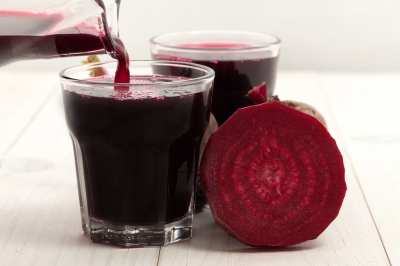Increase Nitric Oxide and Decrease Blood Pressure with Beetroot Juice
 There are many heart disease risk factors, such as high blood pressure and high cholesterol, associated with low nitric oxide levels.
There are many heart disease risk factors, such as high blood pressure and high cholesterol, associated with low nitric oxide levels.
Nitric oxide has many bodily functions, include vasodilation of blood vessels to govern blood pressure.
It was previously believed nitric oxide was only produced via oxidation of L-arginine, an amino acid, in the presence of oxygen. New research has confirmed a second pathway for increasing nitric oxide levels. This second pathway is the conversion of nitrates to nitrite to nitric oxide.
Vegetables are a source of nitrates.
Approximately 85% of dietary nitrate comes from vegetables. The remaining 15% from drinking water. When you consume dietary nitrates, they are absorbed in the stomach and small intestine. Of the ingested nitrates, about 25% is extracted by the salivary glands and concentrated in saliva. It is an enzyme on the surface of the tongue that converts nitrate to nitrite. When the nitrite in saliva is then swallowed it is converted to nitric oxide by the acidic environment of the stomach.
To restate: Nitrate in food becomes nitrite in saliva which then converts to nitric oxide in the stomach.
Nitric oxide obtained from dietary nitrate sources, such as vegetables, provides an alternate treatment plan for increasing protective nitric oxide levels.
Beetroot juice lowered systolic blood pressure 10.4 mm Hg and diastolic blood pressure 9 mm Hg 2.5 – 3 hours after ingestion.
Continue reading



